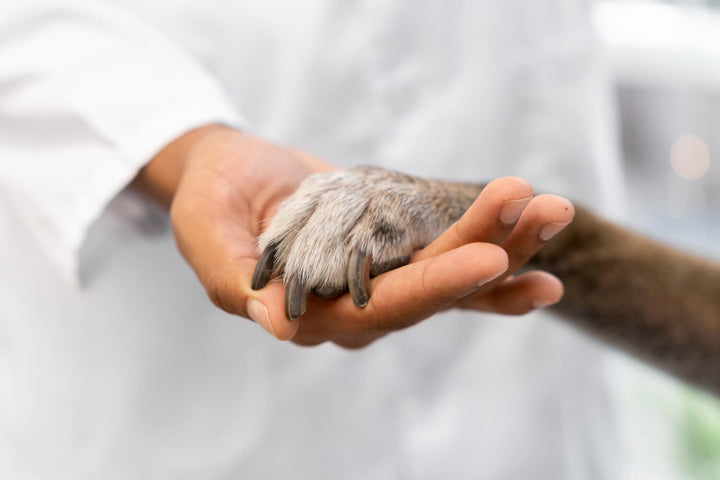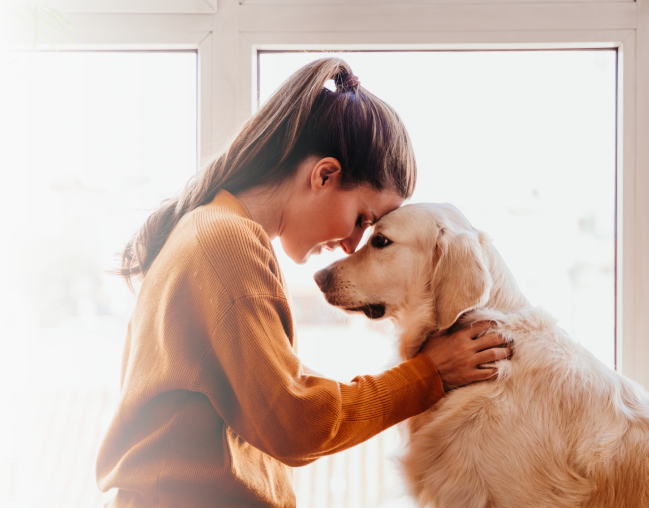The German Shepherd, often hailed as the ultimate working dog, embodies strength, intelligence, and loyalty. With a history rooted in herding and protection, this breed boasts an unparalleled versatility, making it a beloved choice for families, law enforcement, and service roles.
Did You Know these Facts about the German Shepherd?
-
Developed in Germany in the late 19th century, German Shepherds were initially bred as herding dogs, later proving their worth in roles such as police, military, and search and rescue.
-
Commonly referred to as the “Einstein of Dogs”, German Shepherds are renowned for their intelligence, and consistently rank among the most intelligent dog breeds. Their adaptability and quick learning make them exceptional problem solvers and willing learners.
-
Their loyalty and protective instincts have led German Shepherds to serve as guide dogs for the visually impaired, therapy dogs, and even as vital members of search and rescue teams during disasters.
-
German Shepherds exhibit a variety of coat colors, including black and tan, sable, and even all-black or all-white. This diversity in appearance adds to their individuality and charm.
- These remarkable canines have appeared in many movie roles, from the iconic Rin Tin Tin to heartwarming family films, solidifying their place in pop culture history.
According to the American Kennel Club's list of 2022, the German Shepherd ranks as the #4 most popular dog breeds in the USA, and it is also a favorite worldwide.

Traits of the German Shepherd Breed
Overall Personality. German Shepherds combine a fierce loyalty with an affectionate and gentle nature toward their families. They are highly alert, making them exceptional watchdogs and protectors. Their intelligence allows them to adapt to various situations, making them dependable companions.
Family Life. Devoted and loving, German Shepherds form strong bonds with their families. They are great with children when properly socialized and can coexist peacefully with other pets when introduced gradually.
Physical Appearance. German Shepherds boast a well-proportioned physique with a strong, agile frame. Their double coat provides insulation and protection, coming in various colors such as black and tan, sable, and solid black. Their black "saddle" and characteristic markings contribute to their distinctive appearance.
Sociability. German Shepherds thrive on interaction and engagement. They enjoy being an active part of their human family's life and require mental and physical stimulation to prevent boredom.
Average Sizes & Life Expectancy
- Height: 22 to 26 inches tall (56 to 66 cm)
- Weight: 50 to 90 pounds (22.5 to 41 kg)
- Life Expectancy: Around 9 to 13 years
Detailed Description of the German Shepherd Breed
The German Shepherd's legacy as a loyal companion, tireless worker, and remarkable friend endures, cementing its position as one of the world's most cherished and iconic breeds. Let's delve deeper into care, training, and insights that allow you to fully appreciate and embrace the remarkable qualities of the German Shepherd.
Appearance. The German Shepherd's imposing yet graceful stature stands as a testament to its heritage as a versatile working breed. Their strong, muscular frame exudes power, paired with an elegant gait that reflects their agility.
With erect ears and an alert expression, these dogs possess an aura of intelligence and readiness. A double coat, composed of a dense undercoat and a coarser outer layer, provides insulation and protection against various weather conditions.
Renowned for their sharp, expressive eyes, German Shepherds often showcase a soulful gaze that mirrors their innate understanding and emotional connection with their human companions. Their coats come in a range of colors, including the classic black and tan, sable, all-black, and all-white variations, each adding a unique touch to their individuality.
Temperament. German Shepherds epitomize devotion and loyalty, forming deep bonds with their families. Their protective instincts make them natural guardians, ready to defend their loved ones if necessary.
Their inherent intelligence and problem-solving abilities contribute to their versatility in various roles, from loyal family pets to indispensable working dogs.
Despite their protective nature, German Shepherds possess a gentle and affectionate side. They thrive on companionship and interaction, making them cherished members of households where they can fully engage with their human counterparts.
Their remarkable capacity for empathy allows them to sense emotions and respond with unwavering support, making them valued therapy dogs for individuals in need.
Adaptability. German Shepherds thrive in diverse environments, making them adaptable companions for various living situations. Whether residing in bustling cities or tranquil rural areas, these dogs exhibit an uncanny ability to adjust and contribute positively to their surroundings.
Their versatility extends to their roles; they excel in family dynamics, perform essential service tasks, and display unmatched dedication in search and rescue operations.
Care Guidelines. Maintaining the well-being of a German Shepherd involves proper nutrition, regular exercise, and grooming.
A balanced diet tailored to their age and activity level ensures optimal health.
Engaging them in physical and mental activities like daily walks, interactive play, and training sessions prevents boredom and promotes their overall fitness.
Training Strategies. German Shepherds thrive on mental stimulation and challenges. Early and consistent training is essential to channel their intelligence and energy constructively.
Positive reinforcement methods work best, enhancing their willingness to learn and perform commands. Engaging in activities like obedience training, agility, and advanced tasks harness their potential and foster a strong bond between dog and owner.
Notable in History and Pop Culture. German Shepherds have left an indelible mark on history and popular culture. Their impeccable work as police and military dogs showcases their unmatched dedication to duty and service.
In the realm of cinema, Rin Tin Tin, a German Shepherd rescued during World War I, rose to fame as a silent film star, captivating audiences with his performances.
Additionally, German Shepherds have played pivotal roles in historic moments, demonstrating their loyalty and bravery in various real-life scenarios.
In conclusion. The German Shepherd stands as a true testament to the bond between humans and dogs. With their captivating blend of loyalty, intelligence, and versatility, they have etched their mark in history as unwavering protectors and trusted companions.
From their imposing yet elegant physical presence to their gentle and empathetic nature, these dogs exemplify the essence of a true partner. As we celebrate their rich heritage and multifaceted role in our lives, the German Shepherd continues to inspire, uplift, and embody the very essence of a remarkable canine companion.
What to expect when living with the German Shepherd Breed
Bringing a German Shepherd into your household is a fulfilling experience, but it requires commitment, dedication, and the willingness to provide the love and care these remarkable dogs deserve. Their loyalty, intelligence, and versatility make them cherished members of families and invaluable companions for those who lead an active and engaging lifestyle. By understanding their needs, health considerations, and unique traits, you'll embark on a rewarding journey filled with shared adventures and an unbreakable bond.
Personality. Known for their unwavering devotion, these dogs form deep connections with their families and are exceptionally protective.
Their intelligence and ability to learn quickly make them adept at various tasks, while their loyal nature ensures they stand by their loved ones in all situations.
Ideal Environment. German Shepherds thrive in environments that offer ample opportunities for physical and mental stimulation. Active families or individuals who enjoy outdoor activities such as hiking, running, or even engaging in dog sports will find an ideal companion in this breed.
These dogs revel in companionship and fare well in homes where they can engage in meaningful interaction with their human pack.
Maintenance Level. While the German Shepherd's coat isn't excessively high-maintenance, it does require regular attention. Brushing several times a week helps manage shedding, promotes healthy skin, and keeps their fur in prime condition.
Routine grooming, including nail trimming and ear cleaning, is necessary to prevent discomfort and potential health issues. Mental stimulation is equally crucial; engaging in activities like puzzle toys and training sessions prevents boredom and contributes to their overall well-being.
Overall Health Expectations and Best Health Tests for the German Shepherd Breed
Health Considerations. As with any breed, understanding the potential health concerns that German Shepherds may face is crucial.
Hip and elbow dysplasia, common orthopedic issues, are conditions that owners should be vigilant about. Regular veterinary check-ups and screenings, including X-rays and physical examinations, can help identify these concerns early.
Additionally, routine eye examinations and tests for genetic disorders specific to the breed, such as degenerative myelopathy, aid in maintaining their health and addressing potential issues promptly.
Some health issues that German Shepherds may be prone to include hip dysplasia, elbow dysplasia, degenerative myelopathy, pancreatic insufficiency, eye conditions, and cancer.
They are also susceptible to heart conditions, certain allergies, and thyroid disorders. Regular veterinary check-ups and open communication with your veterinarian are crucial to identifying and addressing potential health issues early.
Recommended Health Tests. To ensure the long-term health of your German Shepherd, specific health tests are advisable. These may include hip and elbow evaluations, thyroid functions testing, eye examinations, and cardiac screenings. Regular check-ups will aid in early detection and proactive management of potential health concerns.
Best Nutrition, Diet & Supplements for the German Shepherd Breed
Nutrition and Diet. Providing a balanced and nutritious diet is crucial to the overall health and well-being of your German Shepherd. These intelligent and active dogs require proper nutrition to support their energy levels, muscle development, and immune system. Choose a premium-quality commercial dog food that is specifically formulated for large and active breeds.
German Shepherds thrive on a diet rich in high-quality animal protein. Protein supports muscle development, tissue repair, and overall growth. Aim for a diet with around 18-22% protein content. Look for a protein source like chicken, beef, or fish as the primary ingredient. Avoid foods with excessive fillers, artificial additives, and by-products.
German Shepherds are prone to joint issues, so consider a diet that includes glucosamine and chondroitin sulfate. These supplements support joint health and mobility.
Supplements. While a balanced diet should provide most of the necessary nutrients, certain supplements can benefit your German Shepherd's health. Common supplements include: glucosamine, fish oil, probiotics and multivitamins.
Hydration. Always provide access to clean, fresh water to keep your German Shepherd properly hydrated.
Foods to Avoid. Certain human foods can be toxic to dogs. Avoid feeding your German Shepherd chocolate, grapes, raisins, onions, garlic, and foods high in salt and fat.
Portion control is essential to prevent obesity, which can exacerbate joint problems. Follow feeding guidelines based on your dog's age, weight, and activity level.
Grooming Requirements for the German Shepherd Breed
German Shepherds have a double coat that requires regular grooming to keep their coat healthy and shiny. Proper grooming not only enhances their appearance but also helps manage shedding and promotes overall well-being. Here's a guide to grooming your German Shepherd:
Coat Maintenance and Shedding. German Shepherds shed year-round, with heavier shedding occurring during seasonal changes.
Regular brushing is essential to remove loose hair, prevent matting, and distribute natural oils. Use a bristle brush or an undercoat rake to reach the dense undercoat. Since they shed all-year-round using a de-shedding tool can help manage loose hair and reduce shedding around the house.
Paw Care and Hygiene. Examine your dog's paws for cuts, foreign objects, or signs of irritation. Regularly trim the hair between the paw pads to prevent matting and discomfort.
Trim your dog's nails regularly to prevent overgrowth and discomfort. Long nails can cause pain while walking and may even lead to joint issues. If you're unsure, consult a professional groomer or veterinarian.
Ears and Dental Hygiene. Check your dog's ears regularly for signs of infection or debris. Clean them gently with a veterinarian-recommended ear cleaner to prevent ear problems.
Brush your German Shepherd's teeth several times a week to maintain good oral hygiene and prevent dental issues. Dental chews and toys can also help reduce plaque buildup.
Bathing Frequency. Bathe your German Shepherd as needed, typically every 6-8 weeks or when they get dirty. Use a gentle dog shampoo to avoid stripping the natural oils from their coat.
Exercise Required for the German Shepherd Breed
German Shepherds are highly active and energetic dogs that require regular exercise to keep them physically and mentally stimulated. Proper exercise helps prevent behavioral issues and promotes a healthy lifestyle.
Engage your German Shepherd in daily physical activities such as brisk walks, jogging, hiking, or playing fetch. Aim for at least 60-90 minutes of exercise per day to satisfy their energy needs.
Along with physical exercise, provide mental stimulation through interactive toys, puzzle games, obedience training, and agility exercises. Mental challenges are equally important to keep your German Shepherd engaged and prevent boredom.
Mix up the types of exercises to prevent monotony. Take your dog to different environments, such as parks, trails, or open spaces, to keep their interest and curiosity alive.
German Shepherds are social dogs that enjoy interaction with humans and other dogs. Incorporate regular socialization activities like dog park visits or playdates to enhance their social skills.
Training Tips for the German Shepherd Breed
Training your German Shepherd is essential for creating a well-behaved and well-adjusted companion. These intelligent dogs thrive when given clear guidance and mental challenges. Here are some training tips for your German Shepherd:
-
Positive Reinforcement. Use positive reinforcement techniques such as treats, praise, and rewards to encourage desired behaviors. German Shepherds respond well to positive feedback and are eager to please.
-
Start Early. Begin training your German Shepherd from a young age to establish good habits and build a strong foundation. Socialization, basic commands, and leash training are crucial early lessons.
-
Consistency. Be consistent in your training approach and commands. Use the same cues and rewards to avoid confusion and reinforce learning.
-
Obedience Training. Enroll your German Shepherd in obedience classes to learn basic commands like sit, stay, come, and heel. Advanced training can include tricks, agility, and even search and rescue activities.
-
Leash Training. German Shepherds are strong dogs, so proper leash training is essential. Teach loose leash walking and discourage pulling to ensure pleasant walks.
-
Avoid Harsh Methods. Avoid using harsh training methods or punishment, as they can damage the trust and bond between you and your dog. Positive reinforcement yields better results.
-
Mental Challenges. Keep your German Shepherd's mind active with mental exercises like puzzle toys, scent games, and obedience challenges. Mental stimulation helps prevent boredom-related behaviors.
- Socialization. Expose your German Shepherd to various people, animals, and environments to ensure they are well-socialized and confident in different situations.
The German Shepherd Breed is Suitable For
This breed is suitable for various types of homes and lifestyles, but certain factors should be considered to ensure a harmonious match. German Shepherds thrive in homes that provide them with ample physical and mental stimulation.
Here's what to consider when determining if a German Shepherd is the right fit for your home:
-
German Shepherds are energetic and require daily exercise and mental challenges. Active families who enjoy outdoor activities, jogging, or hiking are well-suited for this breed.
-
These dogs appreciate space to roam and play. A home with a secure, fenced yard allows them to engage in supervised play and exercise freely.
-
German Shepherds are intelligent and often require experienced owners who can provide consistent training, socialization, and leadership. Their high intelligence makes German Shepherds excellent candidates for various training activities, including obedience, agility, and even search and rescue work.
- German Shepherds excel in working roles such as police, search and rescue, and service dogs. Homes that require a loyal and protective companion will find these qualities in a German Shepherd.
The German Shepherd Breed is Not Suitable For
-
If you're not able to provide daily exercise and mental stimulation, a German Shepherd may become bored, which can lead to behavioral problems.
-
While it's possible to have a German Shepherd in an apartment, their active nature and need for space make them more suitable for homes with larger yards.
-
German Shepherds need early and ongoing socialization to become well-adjusted companions. Homes that can't commit to this may not be ideal.
- German Shepherds thrive on companionship and interaction. Leaving them alone for extended periods may lead to separation anxiety and undesirable behaviors.
Famous German Shepherd Owners
-
President Franklin D. Roosevelt - President Roosevelt owned a German Shepherd named Major. Major was known for his loyalty and even traveled with the president during his time in office.
-
Willie Nelson - The legendary musician and activist Willie Nelson has been a proud owner of German Shepherds. His affection for these dogs has been well-documented over the years.
- Albert Einstein - Einstein had a German Shepherd named "Chico" who was known to accompany him on walks and keep him company while he conducted his groundbreaking scientific work. Chico was known for his loyalty and affection toward Einstein, further highlighting the strong bond that can develop between a German Shepherd and its owner.
Accomplishments of the German Shepherd Breed
German Shepherds are renowned for their exceptional intelligence, versatility, and loyalty, which have led to various accomplishments.
German Shepherds are widely used in police and military work due to their trainability, courage, and strong sense of duty. Their keen sense of smell and tracking abilities make them invaluable in search and rescue missions, helping locate missing persons or disaster survivors.
German Shepherds are often chosen as service dogs for individuals with disabilities. They assist with tasks like guiding the visually impaired, providing support for mobility challenges, and offering emotional support.
Historically bred as herding dogs, German Shepherds excelled in guiding and protecting livestock, showcasing their versatility and adaptability.
These amazing dogs have been featured in numerous movies, TV shows, and books, showcasing their intelligence, loyalty, and heroism. They've become symbols of courage and companionship in various forms of media. These accomplishments highlight the German Shepherd's exceptional abilities and impact across various fields, solidifying their reputation as a remarkable and respected breed.

The History of the German Shepherd Breed
The history of the German Shepherd breed is a fascinating journey that spans over a century, shaped by the breed's origins, purpose, and evolution.
Creation and Purpose. The German Shepherd breed was created in the late 19th century by Captain Max von Stephanitz, a German cavalry officer with a vision for a versatile and intelligent working dog.
His goal was to develop a breed that possessed superior traits suitable for herding and guarding sheep, as well as assisting with other tasks. Von Stephanitz believed that by selectively breeding dogs with desirable qualities, he could create a new breed that excelled in various roles. His efforts led to the creation of the German Shepherd, a breed that combined the best traits of herding and working dogs.
The first German Shepherd, named Horand von Grafrath, was registered in 1899 as the foundation dog for the breed. This marked the official beginning of the breed's history.
Early Roles and Evolution. The breed's intelligence, strength, and trainability quickly gained recognition, and German Shepherds were soon employed in various roles, including police, military, search and rescue, and service work.
Their versatility and adaptability made them indispensable in various fields, and their loyalty and protective nature endeared them to families as well.
Throughout the 20th century, German Shepherds played pivotal roles in both World Wars, serving as messenger dogs, sentries, and search and rescue dogs. Their remarkable abilities and contributions further solidified their reputation as a valuable and versatile breed.
Changes and Modern Impact. Over time, the breed's appearance and characteristics underwent some changes due to differing breeding goals and preferences. Show lines emerged, focusing on physical conformation for dog shows, while working lines prioritized the breed's original functionality. Despite these differences, the breed's core qualities of intelligence, loyalty, and versatility remained.
Today, the German Shepherd continues to excel in various roles, from police and military work to therapy and service dogs. Their innate ability to learn and adapt, coupled with their strong work ethic, makes them a beloved choice for families, professionals, and enthusiasts alike.
These days, German Shepherds remain a symbol of courage, intelligence, and loyalty. Their legacy as a working breed, originally created with a specific purpose in mind, has evolved into a breed that embodies the ideals of a true companion, protector, and partner in various aspects of modern life.
The German Shepherd Standard
The German Shepherd is classified within the Herding Group by the American Kennel Club (AKC). This group is composed of breeds originally developed for herding livestock, showcasing their intelligence, agility, and strong work ethic.
The AKC's Breed Standard for the German Shepherd outlines the ideal characteristics of the breed. This includes their size, proportions, coat, colors, and overall conformation. This standard serves as a guideline for breeders and judges in dog shows, ensuring that each dog is evaluated against a consistent set of criteria.
The German Shepherd Dog Club of America (GSDCA) is the official national breed club for the German Shepherd in the United States. You can find more information about this club and the breed's standards, events, and resources on their website: GSDCA
General Appearance
The German Shepherd is an iconic and instantly recognizable breed, renowned for its combination of strength, elegance, and purposeful demeanor. Every aspect of their appearance is a reflection of their versatile nature and exceptional capabilities.
Head, Muzzle, Nose. The German Shepherd's head is noble and well-proportioned, blending intelligence and alertness. The muzzle is strong and tapers slightly towards the nose, which is always black. Their keen sense of smell is enhanced by this prominent feature, contributing to their success as search and rescue dogs.
Teeth. A strong and complete set of teeth meet in a scissors bite, providing the German Shepherd with the ability to grasp, carry, and handle objects with precision. Their powerful jaws underscore their heritage as herders and working dogs, capable of performing a wide range of tasks.
Neck. The neck of the German Shepherd is muscular and slightly arched, conveying both strength and grace. This trait complements their confident and commanding presence, making them effective and imposing working dogs.
Body. With a well-balanced and athletic body, the German Shepherd boasts an impressive combination of power and agility. Their deep chest and well-sprung ribs provide ample lung capacity, while a straight back and strong loin emphasize their resilience and endurance.
Tail. The German Shepherd's tail is bushy and hangs in a natural curve, reaching at least to the hock joint. It acts as a vital tool for communication, aiding in balance and signaling their intentions to both fellow dogs and humans.
Coat. One of the breed's defining characteristics is their dense double coat, composed of a harsh outer layer and a thick undercoat. This coat comes in a variety of colors, including black and tan, sable, and solid black. The coat not only protects them from harsh weather conditions but also contributes to their distinct appearance.
Size. German Shepherds are medium to large-sized dogs, with males standing between 24 to 26 inches at the shoulder and females measuring slightly smaller. Their well-proportioned build exudes strength and athleticism, while their size allows them to excel in various roles.
Gait. The German Shepherd's gait is characterized by efficiency and fluidity. They move with a purposeful and ground-covering trot, displaying strong reach and drive in their hindquarters. This distinctive gait is a testament to their working heritage and serves them well in various activities, from herding to agility trials.
The German Shepherd's general appearance is a harmonious blend of form and function. Each element of their physique is carefully designed to serve a specific purpose, whether it's herding livestock, performing search and rescue missions, or excelling in various dog sports. This breed's remarkable combination of physical attributes makes them not only a striking and majestic breed but also a highly capable and adaptable companion in a wide range of endeavors.
Reputable Breeders
It's essential to acquire a dog from responsible and ethical breeders who prioritize the health and well-being of their puppies. Here are a few reputable German Shepherd breeders along with their URLs:
Top Shelters for Adoption
Adopting a dog can be a rewarding experience. Here are five shelters where you might find a German Shepherd in need of a loving home:
Top 5 Frequently Asked Questions & Answers about the German Shepherd Breed
Are German Shepherds good with children?
Yes, German Shepherds are known for their loyalty and protective nature, making them great companions for families with children.
How much exercise do German Shepherds need?
German Shepherds are highly active dogs that require regular exercise, including daily walks, playtime, and mental stimulation.
Do German Shepherds shed a lot?
Yes, German Shepherds have a double coat and shed moderately throughout the year, with heavier shedding during seasonal changes.
Are German Shepherds easy to train?
Yes, German Shepherds are intelligent and eager to please, making them highly trainable. Proper training and socialization are essential.
Are German Shepherds prone to any health issues?
German Shepherds may be prone to hip and elbow dysplasia, as well as certain genetic conditions. Regular veterinary care is important.
A Final Tip for Bringing a German Shepherd into Your Life
Bringing a German Shepherd into your life means welcoming a loyal, versatile, and intelligent companion. Their unwavering devotion, exceptional work ethic, and affectionate nature make them a beloved addition to families, working environments, and various roles.
Whether as a devoted family pet, a dedicated working partner, or a loyal friend, the German Shepherd's remarkable qualities ensure a rewarding and fulfilling experience for those who choose to share their lives with this extraordinary breed.
Valuable Resources for Your Journey to Parenting a German Shepherd
At Felicitails you will find many wonderful services, supplies and guides for your life ahead with a loving pup at your side.

Hope You Enjoyed The Read!
Tag Cloud

A warm welcome from Lindsay & Huck (my English Pointer). Hope you enjoy the read and find just what you are looking for when it comes to living your best life with your loved pets.

-
Dog Breeds
(42)
-
Emotional Support Animals
(10)
-
Dog Grooming
(6)
-
Dog Health
(18)
-
Life with a Dog
(18)
-
Dog Nutrition
(11)
-
Service Animals
(11)
-
Dog Training
(5)






